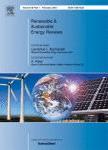版权所有:内蒙古大学图书馆 技术提供:维普资讯• 智图
内蒙古自治区呼和浩特市赛罕区大学西街235号 邮编: 010021

作者机构:Zhejiang Univ Sch Publ Affairs 866 Yuhangtang Rd Hangzhou 310058 Zhejiang Peoples R China German Inst Dev & Sustainabil IDOS Tulpenfeld 6 D-53113 Bonn Germany
出 版 物:《RENEWABLE & SUSTAINABLE ENERGY REVIEWS》 (再生能源及持续能源评论)
年 卷 期:2024年第200卷
核心收录:
学科分类:0820[工学-石油与天然气工程] 080703[工学-动力机械及工程] 08[工学] 0807[工学-动力工程及工程热物理]
基 金:National Key Research and Develop- ment Program of China [2020YFA0608604] Zhejiang Provincial Phi- losophy and Social Sciences Planning Project [21YJRC05-3YB] National Natural Science Foundation of China [72104213, 72273126]
主 题:Housing retrofits Building efficiency improvement Residential energy consumption Carbon emissions Climate issues Sustainable development goals Sustainable cities and communities Climate action China
摘 要:Carbon emissions have become a major contributor to global climate change, with the building sector representing one-third of the global energy demand, and the residential sector accounting for 70 % of final energy demand worldwide. The energy consumption for building cooling has grown rapidly in recent years. Housing retrofits have shown potential in improving building energy efficiency and thus aligning with objectives for energy -saving and carbon emissions reduction in the residential sector. Based on survey data from 28 provinces in China, this study estimates the impacts of housing retrofits on the building energy consumption for air conditioners, as well as impacts on the resulting carbon emissions. Employing Endogenous switching regression to mitigate self-selection bias and the consequent endogeneity problem, the analysis reveals that housing retrofits can reduce building energy consumption and consequent carbon emissions. Furthermore, factors including household characteristics, building attributes and geographic location can influence both residential energy consumption and carbon emissions. In addition, low-income households, families with children and those living in self -owned houses can benefit the most from housing retrofits. This study also offers recommendations to reducing household energy consumption and carbon emissions through improved renovation practices. These insights are instrumental for policymakers in identifying targeted policy objectives across diverse demographic groups. The findings hold relevance for other developing countries with large amounts of inefficient housing stock during rapid urbanization, and those prone to global warming, aiding their pursuit of Sustainable Development Goals.